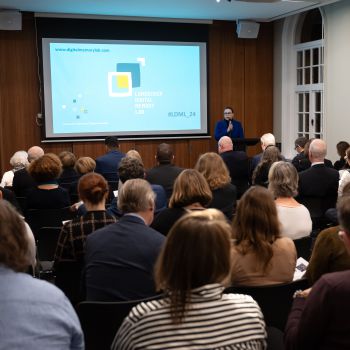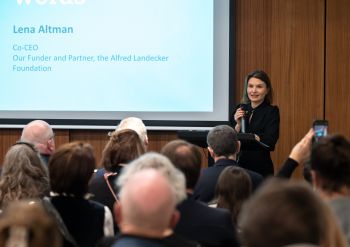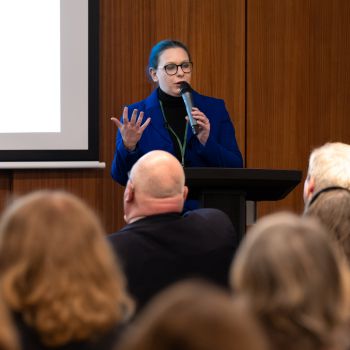Research news
Landecker Digital Memory Lab launches at the Imperial War Museum
By: Stephanie Allen
Last updated: Thursday, 21 November 2024



A new research centre focused on sustaining digital Holocaust memory, was launched this week at the Imperial War Museum, London.
The Landecker Digital Memory Lab sits across the Weidenfeld Institute of Jewish Studies and the University of Sussex’s Digital Humanities Lab, in the Faculty of Media, Arts and Humanities. It will act as a central hub for interdisciplinary knowledge exchange and research on digital Holocaust memory, while helping to combat the growing challenge to expert knowledge on the subject in digital spaces.
In April, the university announced that it had been granted over £3.5million (around 4.1 million Euros) by the Germany-based Alfred Landecker Foundation, to establish the lab. It was the largest grant for humanities research in the history of the university, and the Foundation’s largest ever grant in the field of Holocaust Remembrance research.
Led by Director Victoria Grace Richardson-Walden, Professor of Digital Memory, Heritage, and Culture, the lab’s research has already demonstrated that organisations commemorating the Holocaust are full of ‘digital imagination’ but the sector is facing a ‘sustainability crisis’ because of:
- a lack of basic technological infrastructure to support engagement with digital technologies
- increasing Holocaust denial, distortion and trivialisation online, perpetuated by AI
- a lack of training programmes to improve understanding of the digital aspects of Holocaust memory and education, and how to confront disinformation
To address these urgent problems, over the next five years, the lab will cultivate new knowledge with novel research on topics including the impact of social media, computer games, VR and AR, AI and other digital media on Holocaust memory.
Professor Richardson-Walden said: “Holocaust memory and education organisations are full of brilliant people, but they are faced with multiple challenges that threaten the visibility and impact of their work. The Lab seeks to address these issues by providing a hub that aims to tackle them at the transnational level through interdisciplinary and cross-sector working. Holocaust memory and education are confronting an existential crisis; it has never been more urgent to do this work.”
At the launch event at the Imperial War Museum, Professor Richardson-Walden introduced the initiative to an audience that included Holocaust survivors and their descendants; representatives from Holocaust memory and education organisations; academics; and creative digital media professionals. Speakers included: Lord Khan, Minister for Faith, Communities and Resettlement; Lord Eric Pickles, President of the International Holocaust Remembrance Alliance and The UK Special Envoy for Post-Holocaust Issues; Deputy Vice-Chancellor and Provost Professor Michael Luck; Cornel Sandvoss, Executive Dean of the Faculty of Media, Arts and Humanities, and Lena Altman, Co-CEO of the Alfred Landecker Foundation. Attendees were then given an exclusive insight into the Lab's forthcoming policy guidance on AI and Holocaust education, and an introduction to the Imperial War Museum’s Holocaust Galleries from lead curator Dr James Bulgin.
Vice-Chancellor of the University of Sussex, Professor Sasha Roseneil, said: “Sussex has a longstanding commitment to Holocaust education and research.
“In our fast-changing digital world, in which profound misrepresentation and Holocaust denial are amplified across multiple media platforms and echo chambers, we have a duty to preserve historical records and personal memories in order to ensure that future generations have access to the full truth about the Holocaust.
“We are hugely grateful to the Alfred Landecker Foundation for the trust it is placing in Sussex to deliver on this collective responsibility through the Landecker Digital Memory Lab. The Lab will also make a major contribution to two of the strategic themes of our new University strategy, which will be launched in early 2025: digital and data futures, and human flourishing.”
Over the course of five years, the lab will:
- create a ‘living database-archive’ of worldwide digital projects including hundreds of hours of interviews and walkthroughs
- lead a programme of co-design events held across Europe, Latin America and Australia, bringing together Holocaust memory and education professionals, academics, technology and creative media industries and policymakers
- offer online and in-person opportunities for dialogue among these stakeholders to focus on affecting real change
- engage with funders and policymakers to encourage better support worldwide
- design a suite of training courses designed to enhance critical awareness of digital technologies for Holocaust organisations
- host three large-scale, international events to showcase and learn lessons from initiatives in this field
- host a free advisory and consultancy service
Lena Altman, Co-CEO of the Alfred Landecker Foundation said: “How do we encourage a digital generation to engage with the murder of millions of Jews and apply lessons from this past to contemporary challenges? The Landecker Digital Memory Lab addresses this head-on by mapping existing high-quality digital content on the Holocaust in a unique archive, so that those engaged in historical and political education do not have to reinvent the wheel, but learn from best practice examples instead.”
Find out more about the Landecker Digital Memory Lab at http://www.digitalmemorylab.com/